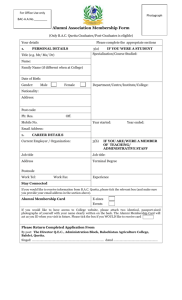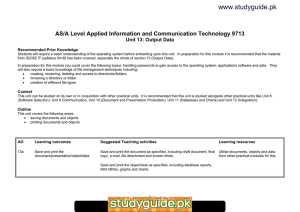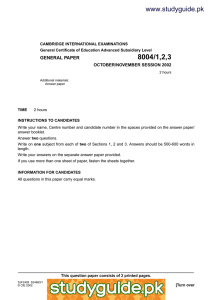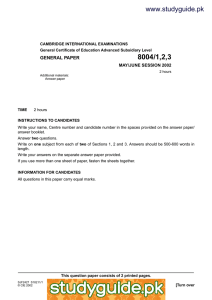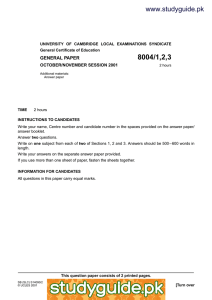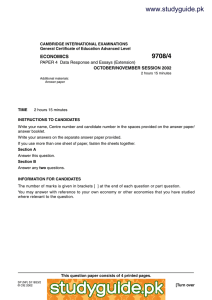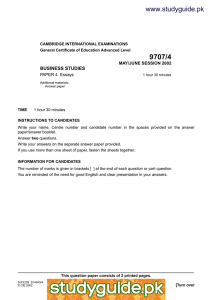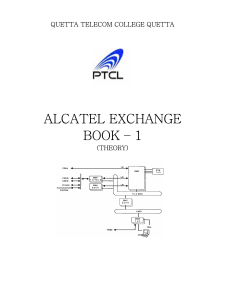www.studyguide.pk
advertisement
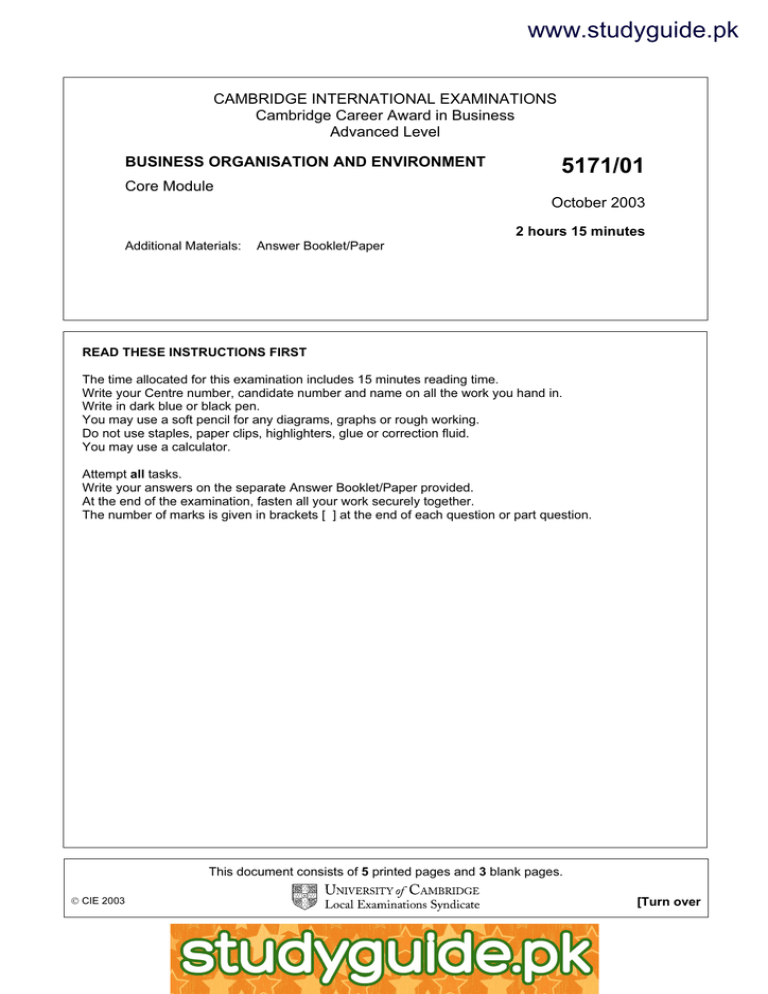
www.studyguide.pk CAMBRIDGE INTERNATIONAL EXAMINATIONS Cambridge Career Award in Business Advanced Level 5171/01 BUSINESS ORGANISATION AND ENVIRONMENT Core Module October 2003 2 hours 15 minutes Additional Materials: Answer Booklet/Paper READ THESE INSTRUCTIONS FIRST The time allocated for this examination includes 15 minutes reading time. Write your Centre number, candidate number and name on all the work you hand in. Write in dark blue or black pen. You may use a soft pencil for any diagrams, graphs or rough working. Do not use staples, paper clips, highlighters, glue or correction fluid. You may use a calculator. Attempt all tasks. Write your answers on the separate Answer Booklet/Paper provided. At the end of the examination, fasten all your work securely together. The number of marks is given in brackets [ ] at the end of each question or part question. This document consists of 5 printed pages and 3 blank pages. [Turn over Ó CIE 2003 http://www.xtremepapers.net www.studyguide.pk 2 You must read the case study below and attempt all the tasks that follow. (The following case study is fictitious) Case Study: Health Care International Health Care International was set up in 1980, as a result of an amalgamation of several small health care companies, to own and run private hospitals. Health Care International now has more than 40 hospitals and all are located in developing countries where labour, land, construction, and running costs are low. Health Care International is a Public Limited Company with an authorised share capital of 700 5 million x $1 ordinary shares of which 500 million have been issued. In addition, the company is financed by ten debentures, each of $1 million at 8.5%. Profits are excellent and the company’s unique selling point is that it serves patients who want world-class medical treatment at a cost lower than that charged in the USA and Europe. This marketing formula has proved to be successful particularly since the ‘health package’ includes flight, treatment, post-operative care and 10 accommodation at about 20% less than western prices. The company is profit-driven but socially aware. Each hospital operates as a separate profit centre but is expected to offer a health service to the poor and the refugees of the local region. So long as it meets the financial targets set by the Health Care International Board, a hospital may treat as many poor and refugees as it can afford. The newest hospital is in Quetta [Pakistan] which is close 15 to Afghanistan’s borders, and this location enables the hospital to help people of two countries. Medicine is distributed free and medical examinations, even surgery, are offered for the equivalent of $5.00. The Director of the Quetta hospital, Abdul Al-Huq, is always keen to point out that the hospital’s patients, apart from contributing to Health Care International profits, indirectly subsidise the health 20 programme of developing countries. He is writing a mission statement that reflects the wider aims of the hospital and company. Leadership style differs from one hospital to another. In Quetta, Al-Huq tries to encourage the democratic approach but the middle and junior ranking staff resist this style. They favour an autocratic style, in the belief that un-skilled and semi-skilled employees need to be firmly 25 controlled. This is causing discontent among many of the hospital staff. Al-Huq recognises that all employees require motivation and says he supports MacGregor’s ‘Theory Y’ and Herzberg’s ideas on job enrichment. Although skilled medical personnel are recruited worldwide, there is a policy to employ as many staff as possible from the country or region where a hospital is located. The hospital in Quetta 30 employs a lot of local staff particularly from middle management downwards, although there are some highly-qualified medical personnel from the host country. Health Care International hospitals appear to be good and flexible employers. People are employed on a variety of contracts e.g. flexitime, part-time, temporary. Job sharing is widespread among the unskilled who were previously unemployed. 35 English is the official language of the hospital but many of the manual and unskilled employees tend not to speak it very well or at all. There is concern about this as the hospital has strict written codes of conduct to follow and also deals with hazardous waste. There are implications regarding suitable and safe conditions of work. Any business is subject to various PEST factors influencing business operations. Health Care 40 International is sensitive to the fact that, being a foreign business, it could be affected by host government policies [e.g. nationalisation] and also to the general influences of, for example, consumer preference, the trade cycle, and changes in disposable income. 5171/1/O/03 www.studyguide.pk 3 Locating in developing countries works well for Health Care International for economic reasons. However, it faces charges of exploitation; for example, the Quetta management have been 45 criticised by a pressure group for employing cheap labour for long and unsocial hours, with few employment rights. Al-Huq said they are in work and receiving good rates of pay. Health Care International cannot operate like a government or a national health service. It is in the market, or private, sector and charges fees. It must advertise its services in order to persuade prospective patients to buy their treatment from Health Care International. The company and the 50 hospitals all employ marketing specialists and keep their marketing objectives under review. Of particular importance are the image and range of saleable services and products. Unless a patient is particularly vulnerable to illness, Al-Huq doesn’t expect repeat business from most of the patients, but the quality of customer (or patient) service is of high priority. Failure to treat patients correctly and in accordance with the Health Care International medical procedures 55 could result in legal action or bad publicity. 5171/1/O/03 [Turn over www.studyguide.pk 4 You must attempt ALL of the following tasks. 1 (a) Although Health Care International is profitable and well financed, it may require additional funding at some time in the future. List three ways in which it might raise additional capital. [5] (b) Health Care International is described as being ‘profit-driven but socially aware’. Using information from the case study explain what this means. [5] (c) Abdul Al-Huq is writing the Quetta mission statement and has included ‘helping to provide employment and better living standards for the local community at large’. Explain how the Quetta hospital is attempting to achieve this business objective. 2 [10] [Total: 20] (a) With reference to the leadership style in the Quetta hospital, explain what is meant by either the autocratic or the democratic leadership style. [5] (b) With reference to the case study, suggest what indicates that the Health Care International company might be decentralised. [5] (c) There seem to be some problems at Quetta regarding the general attitude towards staff although Abdul Al-Huq says he supports MacGregor’s ‘Theory Y’ and Herzberg’s ideas on job enrichment. Describe the main features of these two motivational theories. 3 [10] [Total: 20] (a) The Quetta hospital offers a variety of employment contracts and ‘job sharing is widespread among the unskilled.’ Explain the benefit to the employee of job sharing. [5] (b) The hospital has strict written codes of conduct. Describe what a code of conduct is and why it is thought to be necessary for Health Care International. [5] (c) The Health Care International hospitals appear to be good and flexible employers but the employees still have certain expectations of their employer’s responsibilities towards them. In relation to the Quetta hospital, explain what is meant by the provision of suitable and safe conditions of work, and then identify and describe one other expectation that employees have of their employer’s responsibilities towards them. [10] [Total: 20] 5171/1/O/03 www.studyguide.pk 5 4 (a) Health Care International is aware that all businesses are from time to time influenced by what are known as PEST issues. Discuss how Health Care International and its hospitals might be affected by: (i) pressure groups [5] (ii) changes in disposable income [5] (b) Health Care International locates its hospitals in developing countries. Suggest why it prefers to do this, and indicate what kind of incentives a host country might offer. [10] [Total: 20] 5 (a) The marketing policy of Health Care International and its hospitals is kept under review. Explain what the following two marketing objectives mean in the context of the Quetta hospital: (i) to develop a range of saleable products [5] (ii) to establish the image of the hospital [5] (b) The Quetta hospital is concerned to maintain a high quality of patient service. Keeping in mind that the hospital is not only a medical institution but also a private sector business: (i) explain the importance of a customer or patient service policy [5] (ii) describe two matters that you think the policy should contain [5] [Total: 20] 5171/1/O/03 www.studyguide.pk 6 BLANK PAGE 5171/1/O/03 www.studyguide.pk 7 BLANK PAGE 5171/1/O/03 www.studyguide.pk 8 BLANK PAGE 5171/1/O/03
